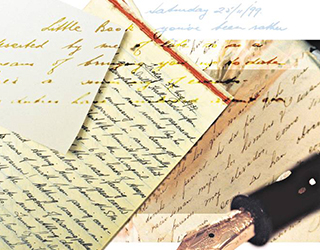Opinion | Cursive Christmas greetings
Opinion | Cursive Christmas greetings
Merry Christmas.
Early I know, but this is my last effort for the year. Yuletide is an appropriate period for a column devoted to business writing.
It’s the one time of the year when there is a flurry of writing, or more correctly, penmanship.
Yep, modified cursive is dusted off for Chrissie cards and we search for the right words before reverting to cliché.
I’m not big on year-in-review stories but a look back over these columns would reveal a theme of the importance of handwriting. Science says it kicks the creative juices into action. Educators say it is still an important tool.
Yet time marches on.
Strange to think then that within 100 years very few people will be able to read the cursive handwriting most Australian schoolkids mastered in bygone centuries. Handwriting experts and/or computer software will decipher it.
Many argue of course it is no loss. The writing was on the wall so to speak. And for many it’s the message, not the means.
Year-in-review stories will place Donald Trump’s election as US president fairly prominently.
Ogilvy Public Relations chairman Chris Graves analysed Trump’s campaign and noted its use of sophisticated psychological techniques often used by advertising and communications agencies to influence consumers.
Trump used direct and repetitious language as well as nostalgic rhetoric. The “concrete” language allowed Americans to visualise what he was saying. Think for example “Lock her up” (Hillary Clinton), “Build that wall” (immigration) and “Drain the swamp”(Washington elites). An imperative verb and the power of three. It worked a treat with disaffected Americans.
Think about that next time you write a list with bullet points.
Sounds simple, but Trump employed data firm Cambridge Analytica and it used psychological profiling to tailor political advertisements to individual personalities.
Trump’s nostalgia kick revolved around “Make America Great Again” and “Not for sale”. Nostalgia bias dictates that people generally look at the past in a more positive light than the reality they experienced. Graves uses the analogy of the success of school reunions.
There were many aspects to the US election result, not the least actually convincing people to vote. And the primary concern of this column is communication, but Graves’ wider observation is apposite: “What is known by all great writers is that if you use abstract jargon language, it makes it very difficult to picture what you are writing about.”
Ah, great writers, maybe F. Scott Fitzgerald, for example. This is one of his pieces of advice about the craft. “Cut out all these exclamation points. An exclamation point is like laughing at your own joke. You don’t write because you want to say something, you write because you have something to say.”
Worth noting when you get the Chrissie cards out. And when you dust off the pen, think of the joy of receiving a handwritten letter.
Note to family: The History and Uncertain Future of Handwriting by Anne Trubek was released last month.
Darrell Croker is senior coach at Write For Impact.

